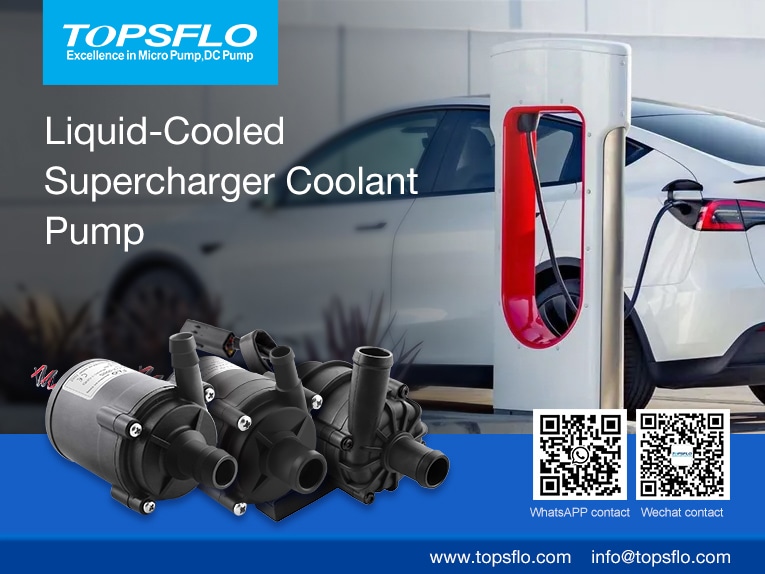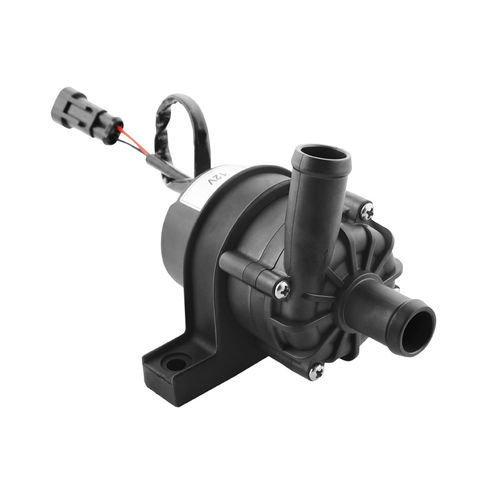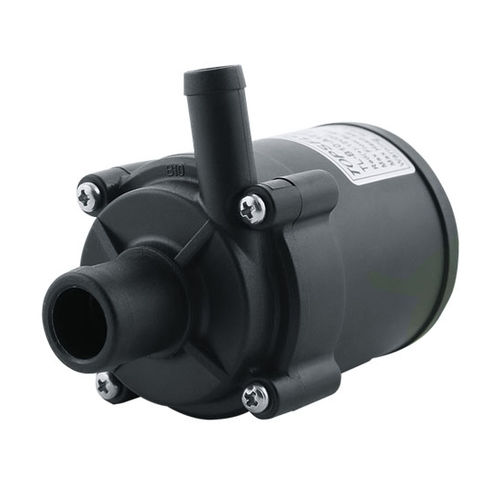
#Industry News
Liquid Cooling is the Future Trend of EV Fast Charger Market
Liquid Cooling EV Fast Charger Pump | TOPSFLO Vehicle Circulation Coolant Pump Manufacturer
Affected by the international situation, oil and energy prices raised in 2022. At the same time, China has pledged to peak carbon dioxide emissions in 2030 and strive to achieve carbon neutrality in 2060. Driven by comprehensive factors, new energy vehicles have become the mainstream of future vehicles. In view of the development of the general environment, the infrastructure supporting facilities for new energy vehicles - the charging pile market has also become the focus of major enterprises.
The latest data from China Economic Net on August 3, 2022: The National Energy Administration held an online press conference for the third quarter of 2022. From January to June, 1.3 million charging stations were added nationwide, 3.8 times that of the same period last year, according to the report. At present, the types of charging products on the market are mainly divided into two categories: liquid-cooled charging products and air-cooled charging products. The main difference lies in the different heat dissipation methods used by the products.
Today, editor will explore the difference and advantages and disadvantages of air cooling and liquid cooling of charging piles, so that you can avoid detours in the design of "charging pile cooling scheme".
Heat dissipation is a difficult problem that must be solved in the construction of charging pile
Compared with other power sources, the system heat dissipation of charging pile is much larger, and the system thermal design requirements are extremely strict.
The power range of DC charging pile is 30KW, 60KW and 120KW, 350KW … 600kW etc. . The efficiency is generally about 95%, so 5% of it will be converted into heat loss, and the heat loss will be 1.5kW, 3KW and 6KW. For outdoor equipment, the heat must be discharged from the equipment, otherwise it will accelerate the aging of the equipment. At the same time, it is necessary to do a good job of waterproof and dustproof treatment to prevent the occurrence of short circuit and signal disorder of electronic equipment.
In order to intuitively let you know the calorific value generated by charging pile under normal operation, we compared the charging pile with 60KW power with the communication power supply cabinet: At present, the nominal efficiency of the mainstream module in the industry is 95%. Taking the 60KW system as an example, the heat dissipation of the module alone reaches 60*0.05*1000=3000W, which means that the heat generated by the charging pile in the charging process is 3 times of the heat dissipated by the communication outdoor cabinet under the same volume condition. It can be seen that the heat generated by the charging pile in the charging process is large, and if it is not released in time, it will cause a great safety accident. Therefore, the heat dissipation problem is one of the problems that must be solved in the promotion and construction of the charging pile system!
Air cooling and liquid cooling are the mainstream cooling methods in the market
At present, the mainstream heat dissipation methods of charging piles mainly include direct ventilation forced cooling, liquid cooling and heat dissipation by heat pipes (the whole machine is closed and air-cooled modules are used). Direct ventilation is the mainstream cooling method for domestic charging modules, but it is transforming to liquid cooling. Liquid cooling has been widely used in North American and European markets and has become the mainstream of the industry.
According to the different designs of air cooling and water cooling, the editor made a simple comparison table of advantages and disadvantages, which can compare the two types more intuitively.
--Air Cooling:
Applicable Devices: Mainly use for charging modules below 30KW
Pros and Cons:
1.Low cost, easy installation, less energy consumption; high failure rate, high later operation and maintenance costs, service life of 3-5 years
2.Air-cooled charging products that are forced to dissipate heat through external air are easily affected by salt spray and corrosive gases, and dust accumulation in the air duct will inevitably affect heat dissipation and stable operation of the module for a long time, resulting in derating or damage. Among the hardware failures of charging equipment, half of The above is the fault of the charging module. The failure rate of the charging module in some stations is as high as 10%, which is mainly caused by environmental corrosion and wet dust.
--Liquid Cooling
Applicable Devices: Suitable for charging modules above 30KW
Pros and Cons:
1.Low failure rate, low operation and maintenance costs in the later period, and service life of 5-10 years
2.Liquid-cooling heat dissipation, adding a liquid-cooling loop to the system, the cooling unit can be separated from the module air duct, the correlation is weak, and it is not necessary to follow the installation position of the module, which provides higher protection and helps reduce the risk of salt spray, Economic losses caused by failures caused by environmental factors such as dust, cotton wool, and climate; at the same time, it reduces the time for regular manual maintenance and dust removal of the module, and reduces maintenance costs.
Advantages and disadvantages of cooling methods.
From the picture, we know that the air-cooled heat dissipation is mainly forced to dissipate heat through the external air, which causes outdoor dust to easily enter the cabinet and contaminate the precision components. If the heat dissipation of the heating body is not strong, the heat is easy to accumulate in the heating body, and even if the external heat dissipation is strong, the effect will be limited. At present, some companies also use closed cold and heat isolation air duct technology to avoid the above shortcomings, and have been applied to actual charging piles.
Breaking through limitations, the overall cost of liquid cooling is lower
For charging operators, charging piles are the production tools they use to make money. In addition to operating income, product quality, service life, and after-sales maintenance costs are all important factors that affect the final revenue. The maximum economic value is excavated during the life cycle, so the one-time purchase cost is no longer the primary concern of operators, and the service life and later operation and maintenance costs have become the key aspects of comprehensive consideration for operators.
Compared with the limitations of air-cooled charging products, liquid-cooled charging products have gradually entered the stage and occupy an important position in the charging market.
So what are the characteristics of liquid cooling of charging modules that have been widely used in North American and European markets? From the perspective of the entire life cycle of the equipment, the overall cost of liquid cooling modules is undoubtedly lower. Compared with air-cooled heat dissipation, liquid-cooled heat dissipation has stronger heat dissipation capacity, higher efficiency, lower power consumption and stronger output voltage.
Heat dissipation capacity: The cooling of the module device is 10~20℃ lower than that of the forced air cooling module.
Efficiency: the highest efficiency > 96%, the overall efficiency > 93%. For example, a 30kW module is used for 300 days a year, and the utilization rate is 20% per day. Each increase of one point can save 450kWh of electricity per year and reduce operating costs (OPEX).
Power consumption: Standby power consumption is less than 10W.
Output voltage: The output voltage of the module can reach 1000V, which is more in line with the construction and layout trend of super charging.
Take the Tesla Supercharger V3's liquid-cooled cable as an example, and its vehicle coolant pump is located at the base of the white SC gear. The appearance is basically the same as the previous generation, the only difference is that the charging cable looks thinner and achieves higher charging efficiency. The specific data are: power conversion efficiency (V3 is 96%, V2 is 92%) and more low cost. The total AC input is 438kVA, 526A, which can support a maximum output power of 250kW. Any additional power can be shared between cabinets. The site master controller is 4G LTE, which is used to detect the power consumption and billing of the car.
TOPSFLO's high-quality liquid cooling water pump is favored by many giants
At present, liquid cooling has become the mainstream of the European and American charging markets, and domestic charging modules have also been concentrating on research and development to transform to liquid cooling. Liquid-cooled heat dissipation charging piles are bound to become the most reliable choice for new energy electric vehicle charging solutions.
In order to achieve the best cooling effect of the charging pile, the selection of high-quality liquid-cooled water pumps is also very important. TOPSFLO liquid-cooled EV chargingcoolant pump has a long life of 30,000 hours, maintenance-free, zero maintenance, and supports the working conditions of storage temperature -40~80 degrees, operating temperature -30~50 degrees, and medium temperature -30~90 degrees, so as to provide new Energy electric vehicles provide stable and reliable charging solutions. At the same time, it also has intelligent control function, which can realize 5V/PWM speed regulation, FG speed signal feedback and other functions, and can customize six protection functions of idling, water shortage, locked rotor, overcurrent, reverse connection, and overvoltage.
With stable performance and rich product selection, TOPSFLO dc supercharging cooling pump has attracted widespread attention in the charging pile industry, and has successfully reached strategic partnerships with many giant companies, such as the successful matching of TOPSFLO TL-B10 four-wire intelligent control water pump. In the projects of famous German companies and domestic listed companies, TOPSFLO TA60 intelligent control model has been used in the products of famous Australian companies and domestic famous companies. There are also a variety of cooling water pumps favored by many charging pile manufacturers. Welcome more charging pile customers to negotiate, and TOPSFLO engineers will recommend the most suitable cooling water pump solution for you.







